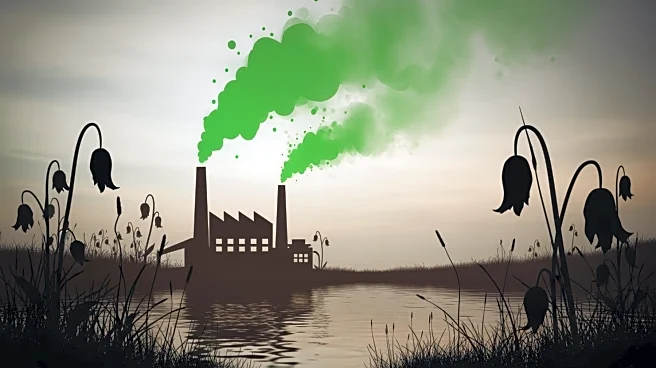What's Happening?
Industrial animal agriculture, characterized by factory farms and slaughterhouses, poses significant threats to air and water quality, wildlife, and human health. Over the past 40 years, the industry has shifted from smaller, diversified farming systems
to large-scale operations that confine thousands of animals in one location. These operations release air pollutants, including ammonia and methane, and discharge harmful substances into water bodies, affecting aquatic habitats. The use of antibiotics and hormones in animal agriculture contributes to health risks such as antibiotic resistance and endocrine disruption.
Why It's Important?
The environmental and health impacts of industrial animal agriculture have far-reaching consequences. The release of pollutants from factory farms affects air and water quality, posing risks to human health and wildlife. The industry's contribution to climate change through greenhouse gas emissions exacerbates global environmental challenges. Additionally, the reliance on commodity crops for animal feed drives unsustainable agricultural practices, leading to habitat destruction and biodiversity loss. These issues highlight the need for improved regulatory measures and sustainable farming practices to protect ecosystems and public health.
What's Next?
Efforts to address the negative impacts of industrial animal agriculture are underway at various levels. Advocacy groups are working to improve federal safeguards and promote sustainable practices. Legal and policy initiatives aim to enhance regulation and oversight of factory farms, focusing on environmental protection and animal welfare. At the community level, there is growing activism to ensure clean air and water and healthy ecosystems. International collaborations seek to address these issues globally, emphasizing the interconnectedness of human and environmental health.
Beyond the Headlines
The broader implications of industrial animal agriculture extend to ethical and cultural dimensions. The treatment of animals in factory farms raises moral questions about human responsibility towards other species. The industry's impact on biodiversity and ecosystems challenges societal values related to environmental stewardship. These considerations may influence public attitudes towards food production and consumption, prompting a shift towards more sustainable and humane practices.
















